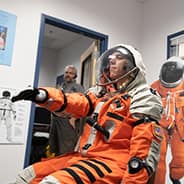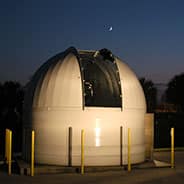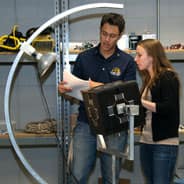Embry-Riddle Advantage
In the coming years, all aspects of space study will experience astronomical changes with the introduction of space tourism. With this growth comes the need for a new generation of space professionals.
Embry-Riddle’s storied history in flight education positioned it to become a pioneering institution for the study of space-related endeavors. It attracts faculty and students who share a passion for not only aviation but for its younger counterpart — aerospace.
We offer space-related degree programs that include Astronomy and Astrophysics, Space Physics, and Spaceflight Operations. Embry-Riddle is a community of students and faculty bound by focus and shared passions. Our students benefit from building relationships with fellow students, faculty, industry professionals, and alliances with organizations and companies including NASA, United Launch Alliance, SpaceX, The Boeing Company, Honeywell, Virgin Galactic, and more.

All students in space-related programs enjoy opportunities for hands-on learning, research, internships, and access to technologically advanced facilities and equipment.
Students who wish to immerse themselves further in space studies can join any of Embry-Riddle’s many groups and organizations dedicated to their passions, including Mars Society, Society of Physics Students, American Astronomical Society, and more.
Our graduates are in demand, and we boast an extremely high hire rate.
Degrees & Programs
Are you seeking a degree to help you transition into a new role or launch your space career? To put you on an upward trajectory, Embry-Riddle offers a full complement of space-related degrees at all levels.
Through your studies, you’ll gain hands-on experience and real-world applications, learning from faculty who are subject matter experts.
Start on your own path toward expertise by exploring our degree program offerings.
Career Outlook
Teaching future astronauts and space enthusiasts, planning a space mission, ensuring space flight safety, working in mission operations, or helping further the commercialization of space — whichever space career path you choose, a degree from Embry-Riddle can help launch you toward your goals.
Our space studies graduates emerge versed in all aspects of spaceflight, including space policy, operations, and regulations.
The Bureau of Labor Statistics projects a bright future for workers trained in these key technical skills.
Through 2024, the bureau anticipates 171,900 overall openings for all types of engineers; 8,600 new jobs for astronomers, space scientists and physicists; and 44,400 openings for aerospace engineering, operations, and other technicians.
Research
Our faculty and students are actively involved in space-related research. Read about how they’re positively impacting the industry in some recent projects below.
Learning Environments
At Embry-Riddle, you’ll discover some of the most advanced, high-tech laboratories and facilities available to students.

Daytona Beach, FL Campus
- The Daytona Beach Campus is located just 50 miles north of Kennedy Space Center and near many of our allied contractors situated on Florida’s Space Coast. With a strong focus on space, the campus features a large array of labs to facilitate hands-on learning through direct experience.
- The Space Physics Research Lab and the Laboratory for Exosphere and Near-Space Environment Studies (LENSES) give students the chance to participate in externally funded research projects.
- Students also use the 1-meter Ritchey-Chrétien reflecting telescope, one of the largest in Florida, to observe our solar system and beyond.

Prescott, AZ Campus
- Prescott’s mile-high altitude and its location away from major cities provide pristine conditions for viewing the night sky. The Prescott Observatory Complex, ranked in the top 10 best college astronomy observatories by Collegerank.com, features a telescope with a 16-inch diameter, connected to a high-precision electronic CCD camera, allowing students to observe the cosmos, make precise measurements of extra-solar planets, and take a hands-on approach to learning about our universe.
- The Prescott Campus also houses a Cosmic Ray Lab, Propulsion Lab, and Laser Interferometer Gravitational-Wave Observatory (LIGO). The LIGO project is a national consortium of universities, including Cal Tech, MIT, and Embry-Riddle, who work together on a National Science Foundation grant to detect and study gravitational waves of cosmic origin throughout the universe.

Worldwide Campus
- Embry-Riddle Worldwide delivers a quality academic experience by expert faculty educators with hands-on industry experience in our three academic colleges and Online Campus. Flexible scheduling and locations close to home are specifically suited for busy working professionals, active-duty military and veterans, and students with families.
- EagleVision, a virtual classroom, combines the power of web video conferencing and learning management system software to maximize the benefits of synchronous and asynchronous virtual learning environments.









